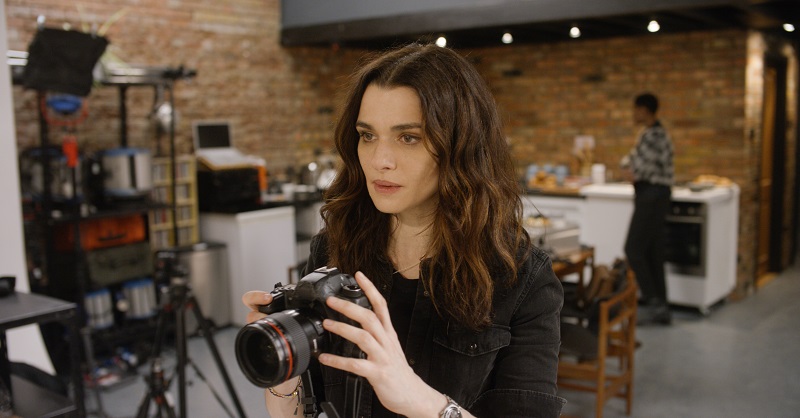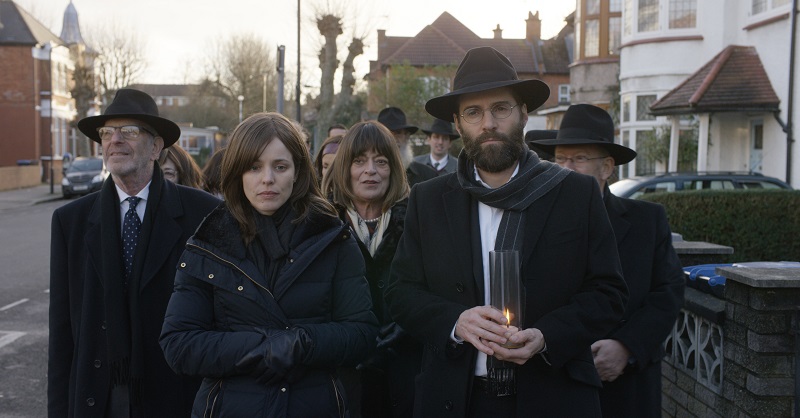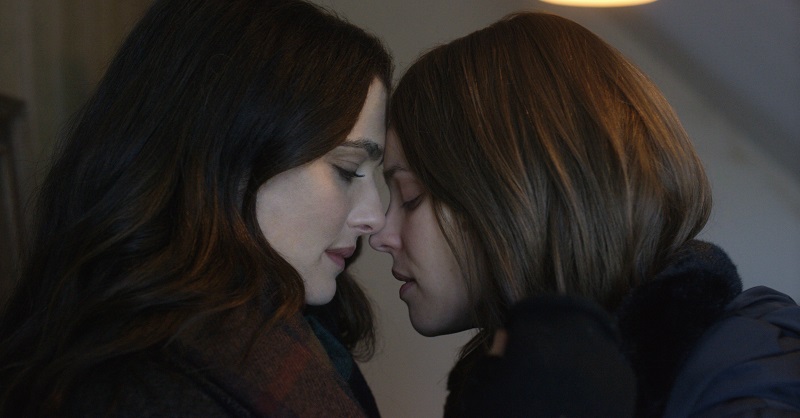Disobedience star Rachel Weisz: ‘There are many like Esti out there’
The Oscar-winning actress stars with Rachel McAdams in the film adaptation of Naomi Alderman's controversial book, exploring the taboo of lesbian love in the Orthodox community
When faith clashes with sexuality, what happens to someone who finds themselves attracted to the same sex, but still wants to adhere to a religious life?
That moral dilemma is explored in a “profoundly loving way” in the screen adaptation of Naomi Alderman’s critically-acclaimed novel, Disobedience, starring Rachel Weisz and Rachel McAdams, which opens in cinemas on Friday.
Chilean director Sebastián Lelio brings to life the story of Ronit (played by Weisz), a rabbi’s daughter and proverbial black sheep of the community, who swaps her claustrophobic life in north London for New York, after a scandalous transgression during her youth.
Get The Jewish News Daily Edition by email and never miss our top stories Free Sign Up
But upon learning of her father’s death, its back to that community she must go, confronting the ghosts of her past along the way.
Among them are Esti (McAdams), now the wife of her strictly Orthodox cousin Dovid (Alessandro Nivola) and the woman with whom she shared an illicit attraction in her teenage years.
Distant at first, the pair soon rediscover their desire for one another
and embark on a passionate affair that threatens to completely unravel both their lives.

When Alderman’s literary debut was published to great acclaim in 2006 – earning her both the Orange Award for New Writers and the Sunday Times Young Writer of the Year Award – it certainly caused ripples within the community she had written about, while cementing her own decision to leave behind life as a practising Jew.
But while it may have been controversial in its subject matter, Disobedience was wholly sensitive in its portrayal of the Orthodox community and the dilemma faced by women like Esti, says Weisz, who also produced the film after optioning its rights four years ago.
The 48-year-old Oscar-winning actress tells me: “Naomi grew up inside of that community and has since left it, but her book is an incredibly loving portrait of spirituality and shows just how nourishing Orthodoxy can be for those living in that community.
“But then it poses this conundrum – what if you are lesbian, what do you do then? How can you have both spirituality and love? It seems that you can’t really, or it’s very hard. You certainly can’t just stay there.
“Inside that community, there are many Estis. I feel tremendous empathy for someone who finds themselves in this situation. It’s heart-breaking, and I can’t think of a higher stakes dilemma for any individual.”
In preparing for her role, Weisz says she read around the subject, as well as familiarised herself with the Orthodox world – something she admits not knowing much about, having grown up in a liberal Jewish family from Hampstead Garden Suburb.
Given that her character, Ronit, had also stopped practising her Judaism, Weisz says it fell more to her co-stars, McAdams and Nivola, to “immerse themselves in all the prayers and rituals”.
She reveals: “Rachel [McAdams] spent months reading, spending time with Jewish families, learning the prayers, being invited out to Friday night meals and trying on sheitels. I really can’t claim introducing her to any of it!”
There was, however, something Weisz herself was very familiar with – the film’s north London setting – and it evoked a huge sense of nostalgia for the star, who was educated at North London Collegiate in Edgware.
Weisz, who is married to James Bond actor Daniel Craig and recently gave birth to a daughter, says: “We filmed around Golders Green Road and Hoop Lane. I used to walk that way to get home from school, having taken the Northern Line from Edgware to Golders Green, then walk back up to Hampstead Garden Suburb.
“There used to be a shop there called 32 Flavours, where we all used to hang out after school and get ice cream.”
Away from the Jewish rituals and north London backdrop, Disobedience is, of course, a story about the forbidden relationship between two women and the film does not shy away from depicting their love-making.

While the six-minute lesbian sex scene might not involve much in the way of removing clothes, Weisz admits feeling “emotionally naked” and had some trepidation before filming it, but says the director approached it in a “respectful” way.
She reveals: “I think both Rachel and I were anxious and scared on some level. It’s a very emotional scene. But Sebastián storyboarded it all beforehand, all the gestures, the way it was shot and where the camera would be.
“He authored what the scene would be, and so we felt prepared as actors to then fill it with the emotion needed.”

Following on from the 2016 film Denial, in which Weisz portrayed historian Deborah Lipstadt’s landmark libel case against Holocaust denier David Irving, Disobedience is only the second film in her varied and award-winning career in which she has portrayed an overtly Jewish character.
I ask Weisz if she is now tapping more into her Jewish identity when choosing her next project.
“In a way it’s surprising that I lived so long and worked so long before
I represented a Jewish character,” she smiles.
“But I really do things on the strength of the story. Disobedience really struck me as something that was very realistic and truthful, so it was important this story was told.”
Disobedience (15) is in cinemas from Friday
Listen to this week’s podcast here:

Thank you for helping to make Jewish News the leading source of news and opinion for the UK Jewish community. Today we're asking for your invaluable help to continue putting our community first in everything we do.
For as little as £5 a month you can help sustain the vital work we do in celebrating and standing up for Jewish life in Britain.
Jewish News holds our community together and keeps us connected. Like a synagogue, it’s where people turn to feel part of something bigger. It also proudly shows the rest of Britain the vibrancy and rich culture of modern Jewish life.
You can make a quick and easy one-off or monthly contribution of £5, £10, £20 or any other sum you’re comfortable with.
100% of your donation will help us continue celebrating our community, in all its dynamic diversity...
Engaging
Being a community platform means so much more than producing a newspaper and website. One of our proudest roles is media partnering with our invaluable charities to amplify the outstanding work they do to help us all.
Celebrating
There’s no shortage of oys in the world but Jewish News takes every opportunity to celebrate the joys too, through projects like Night of Heroes, 40 Under 40 and other compelling countdowns that make the community kvell with pride.
Pioneering
In the first collaboration between media outlets from different faiths, Jewish News worked with British Muslim TV and Church Times to produce a list of young activists leading the way on interfaith understanding.
Campaigning
Royal Mail issued a stamp honouring Holocaust hero Sir Nicholas Winton after a Jewish News campaign attracted more than 100,000 backers. Jewish Newsalso produces special editions of the paper highlighting pressing issues including mental health and Holocaust remembrance.
Easy access
In an age when news is readily accessible, Jewish News provides high-quality content free online and offline, removing any financial barriers to connecting people.
Voice of our community to wider society
The Jewish News team regularly appears on TV, radio and on the pages of the national press to comment on stories about the Jewish community. Easy access to the paper on the streets of London also means Jewish News provides an invaluable window into the community for the country at large.
We hope you agree all this is worth preserving.
-
By Brigit Grant
-
By Laurent Vaughan - Senior Associate (Bishop & Sewell Solicitors)
-
By Laurent Vaughan - Senior Associate (Bishop & Sewell Solicitors)
-
By Laurent Vaughan - Senior Associate (Bishop & Sewell Solicitors)
-
By Laurent Vaughan - Senior Associate (Bishop & Sewell Solicitors)





















